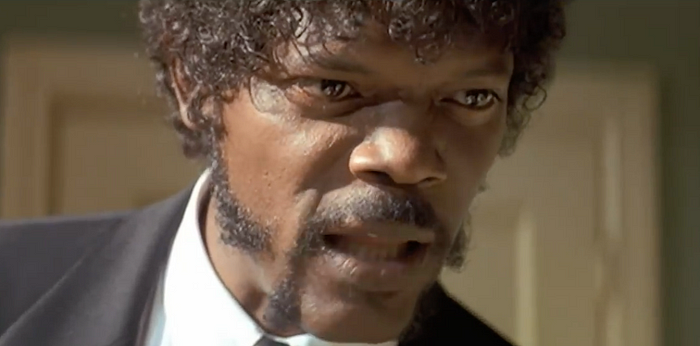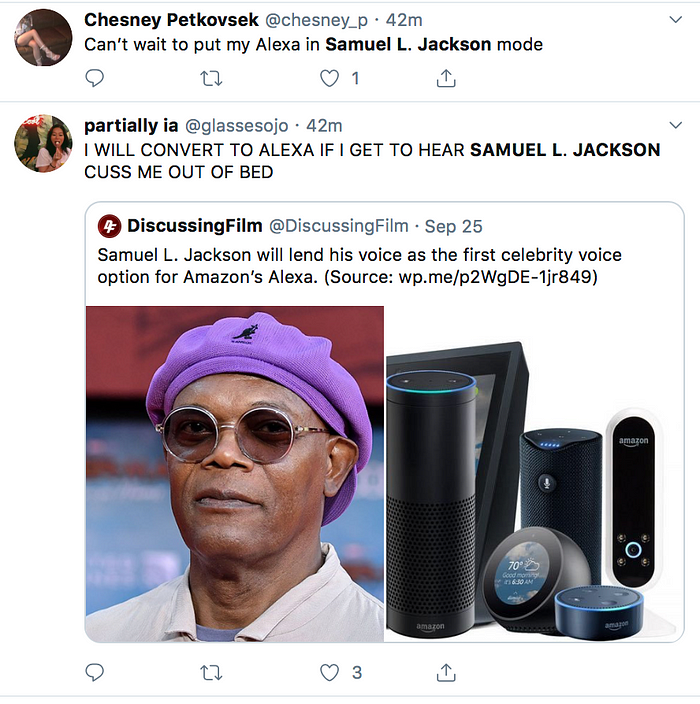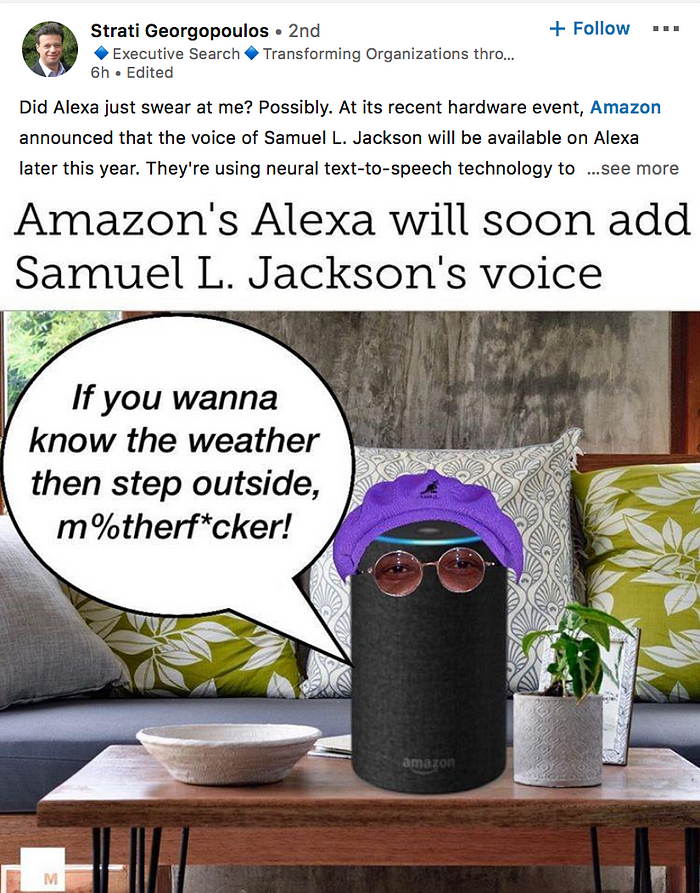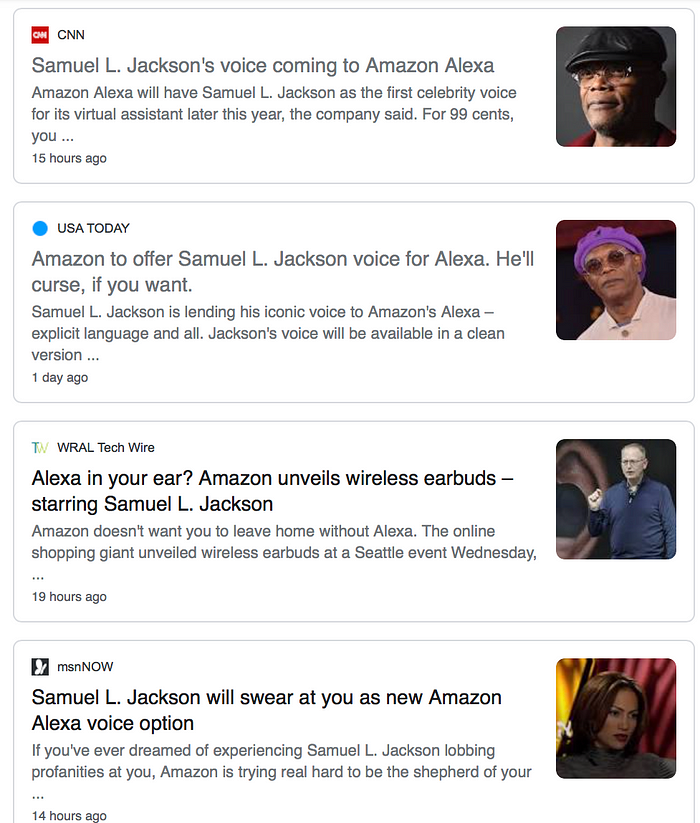
Why Samuel L. Jackson Became the Voice of Alexa
Why are we so excited about the sound of Samuel L. Jackson’s voice coming to Alexa?
On September 26, Amazon announced that Jackson will be the first celebrity to lend his voice to the Alexa voice assistant. Later in 2020, if you use Alexa, you’ll be able to add a Samuel L. Jackson skill, meaning that you can ask Alexa to perform a number of tasks in the voice of the beloved actor. He’ll do everything from tell jokes to sing happy birthday. And yes, the skill comes with both a G-rated and a profane version, in case you’d like Alexa to unleash full-bore Big Kahuna-munching Jules Winnfield on your living room through your Amazon Echo speaker.
You can’t make Alexa talk like Jackson all the time — the skill is limited to whatever it’s been programmed to do. The skill employs neural text-to-speech technology (TTS), which translates written text to spoken word with a tone and voice to reflect a personality. Businesses are exploring TTS to inject personality into voice-based interfaces such as bots and content that requires voice-over narration.
The Internet Rejoices
Even though the Jackson skill sounds basic, just the notion of having Samuel L. Jackson dropping F bombs as he delivers the weather report sent the internet into a tizzy of joyful celebration. Social media celebrated a life in which Alexa would sound like the man who told us to hold on to our butts in Jurassic Park and pondered the path of the righteous man in Pulp Fiction:


And journalists did, too:

But why did the news trigger such an outpouring of excitement about an Alexa skill that performs rudimentary tasks?
Voice Assistants Catch On
Well, for one thing, voice assistants are rapidly catching on. An estimated 40 million Americans, or 12 percent of the population, own an Echo, versus 30 percent who own iPhones — not bad penetration for a product that was released (in limited distribution) only five years ago. All told, about a third of Americans say they use voice assistants regularly in some form.
Moreover, the Amazon Echo — and the Alexa voice assistant that powers it — most certainly enjoys strong name awareness due to Amazon’s marketing muscle. Amazon announcing a new Alexa skill featuring the voice of Samuel L. Jackson is going to generate buzz, more so than if, say, Microsoft did the same for Cortana. Super Bowl commercials are now featuring Alexa, as a sign of how how familiar we are with Alexa.
A Need for the Familiar
But I believe the enthusiastic response points to something deeper: a need for the familiar. Voice-based technology is coming on strong, as the big tech companies–Amazon, Apple, Google, and Microsoft–race each other to lead a voice-first future. The makers of voice-based apps are betting that the general population is ready to transition from text-based search to using our voices to get what we need, whether we’re searching for a nearby restaurant or finding out the Dow Jones Industrial Average. So they’re barraging us with a slew of products for the home and on the go.
But the hype around voice can be disquieting. We’re still getting used to the idea of a machine listening to us and talking to us in the most intimate places in our lives, including our bedrooms. There is a fear that these AI-fueled devices will insinuate themselves into our lives in the creepiest way possible. As The Atlantic’s Judith Shulevitz discussed in the November 2018 article “Is Alexa Dangerous?”:
For the moment, these machines remain at the dawn of their potential, as likely to botch your request as they are to fulfill it. But as smart-speaker sales soar, computing power is also expanding exponentially. Within our lifetimes, these devices will likely become much more adroit conversationalists. By the time they do, they will have fully insinuated themselves into our lives. With their perfect cloud-based memories, they will be omniscient; with their occupation of our most intimate spaces, they’ll be omnipresent. And with their eerie ability to elicit confessions, they could acquire a remarkable power over our emotional lives. What will that be like?
Recent news reports about voice devices recording what we’re doing — and employees of Amazon, Apple, Facebook, Google, and Microsoft listening in on our private conversation — have ratcheted up the discomfort to a general alarm. Now we have to worry about machines and people eavesdopping on us?
In response to the backlash, tech companies explained that they monitored select voice samples to do quality control and to teach the machines to get smarter; they also rapidly discontinued the practice. In addition, Amazon recently announced new features to give people more control over their privacy when they use Alexa.
Nick Fury to the Rescue
In this context of unease, along comes Samuel L. Jackson lending his voice to Alexa. He has starred in more than 130 movies, including blockbusters such as The Avengers and cultural touchstones such as Pulp Fiction.
And we’ve heard his voice in animated entertainment such as The Incredibles and Grand Theft Auto. It’s a stretch to say that he’s warm and cuddly. But he is familiar and, well, just about everyone’s personification of cool. As with Morgan Freeman, part of his allure is his voice — in Jackson’s case, confident, reassuring, in control, but righteously emotional when the situation calls for a display of passion.
When the chips are down, you want the Nick Fury who Samuel L. Jackson portrayed in The Avengers on your side. And we want him on our side when we venture into a voice-first future.
What Happens Next
Amazon was careful to point out that Jackson is the first, not the only, celebrity, to lend his voice to Alexa. In fact, technically he’s not even the first. In a popular 2018 Super Bowl ad, Alexa assumed the voices of celebrities such as Cardi B and Anthony Hopkins. You know where this is headed, right? It’s only a matter of time before Alexa will assume the form of A listers with familiar voices such as Benedict Cumberbatch (for when we need British cool) and Scarlett Johansson (who famously played the voice of an AI voice assistant that forms a relationship with a human in the movie Her).
Meanwhile, Amazon may gain something important from a relationship with Samuel L. Jackson: cultural relevance. Through a relationship with Jackson, Amazon hopes to make its brand more relevant to the beliefs, attitudes, and interests that bind us as a culture. Through his popular persona, Samuel L. Jackson is part of our cultural fabric. Amazon is a popular utility on which we buy things; it helps us live our lives. But we don’t feel an emotional bond with a utility. Amazon wants to give its brand a face — and a voice — to start forging one.
